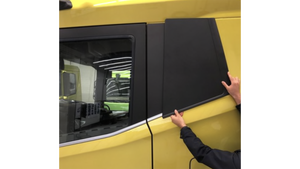Tri-Mack Plastics Mfg. Corp. is the epitome of the new breed of plastics processor that is “more than just a molder.” With a specialized niche producing high-performance components and assemblies for critical applications, Tri-Mack (Bristol, RI) offers a broad range of processes and skills to its customers, including injection molding, precision machining, and engineering support.
March 1, 2010
Expertise in high-temperature and highly filled thermoplastics, an AS9100-certified quality system, and the latest manufacturing technology keeps Tri-Mack on the leading edge. Ed Mack II, president of Tri-Mack, talked to MPW about the company’s evolution and how it stays at the forefront of its chosen market niche.
MPW: Your company is more than 30 years old. How did it get started?
Mack: What we do today is truly an evolution of the company started by my father, a polymer chemist who specialized in tribology, the study of friction wear. His focus was in high-temperature, high-performance materials, so the company was founded on the specialized materials that he developed. We found applications for these materials in the aerospace industry, and as we worked closely with our customer base over the years, we became adept as problem solvers offering material solutions. As needs arose in the marketplace, we expanded our ability to solve problems by offering more manufacturing technologies and engineering support to our customers.
MPW: While you have a very specific market niche, you offer a variety of processes and materials. What are they?
Mack: Our roots in compression molding PTFE compounds led us into injection molding high-temperature materials such as PEEK, Torlon, Ultem, Ryton, Amodel—and highly filled compounds using carbon fiber, glass fiber, and wear-resistant additives. For these materials, conventional tooling usually does not work, so we began making our own hard steel precision injection mold tooling. We have full in-house tooling capability, including wire and sinker EDM. To support our customers’ needs for tighter tolerances and more complex geometries, we assembled our CNC machining departments.
Our machining capability enables Tri-Mack to provide parts machined from stock shapes for prototyping and production as well as supporting secondary operations for near-net molded parts. We machine plastics such as Vespel, Teflon, and PEEK, but also produce metallic components used for insert molded assemblies. Tri-Mack also offers bonding, assembly, and functional testing. As new opportunities arise, our vertical integration enables us to work on many different kinds of parts with highly engineered performance requirements.
MPW: Recently you received an award from one of your customers—General Electric Aviation’s Supplier Quality Awareness Award. How did that come about?
Mack: We’ve been working closely with GE Aviation for more than 30 years. This award was in recognition of Tri-Mack’s services and achievements in supplying parts for the GENx-1b, a next-generation turbofan engine. The GENx-1b incorporates a new technology for oil cooling that uses a surface flow cooler on the outer flow path of the aft fan case. Tri-Mack manufactured six different injection molded parts in extremely complex mold tooling on a very accelerated schedule.
MPW: What was the key to making this project so successful?
Mack: Well, there were several. I believe one was our ability to work collaboratively with GE. Tri-Mack’s engineering staff worked concurrently with GE on the GENx-1b to optimize part designs for manufacturability and overall cost-effectiveness. Additionally, our ability to develop creative solutions to optimize processing also contributed to the success of this project. In this case, Tri-Mack’s tool design for the project used proprietary hand loads to mold complex geometry, including molded in-place metal inserts. We also employed advanced selective laser sintering technology to save time in the development process. During the project, the engineering toolroom and production staff worked around the clock to create hundreds of components in record time.
MPW: What does it take to maintain quality for a big company like GE Aviation?
Mack: Like most other markets, it takes meeting the customer’s requirements with zero defects at reduced costs (3%-6% every year) and reduced lead times. It’s hard to talk about quality unless you talk about price and delivery as well. Quality is so woven into the culture of this company, that it’s hard to separate it and just talk about parts.
Tri-Mack’s ISO 9001:2000/AS9100-certified quality system covers all aspects of our company from management responsibilities through specific work instructions. We embrace continuous improvement at all levels of our organization and this is key to meeting customer requirements. Tri-Mack has embarked on a lean program, including lean scheduling to improve deliveries and better manage our inventory. We continue to add automation such as wireless touch probes that do the inspection right in the machining center. These are examples of how we make Tri-Mack a continually improving company and are able to satisfy our customer’s needs.
MPW: Are you primarily a supplier to the aerospace/defense industry?
Mack: Yes, about 70% of our business comes from that market.
MPW: Being highly specialized in a singular market must have advantages for you, as you seem to be successful in aerospace.
Mack: Yes, being highly specialized and using high temperature engineering materials means that we’re not just another molder. There are a lot of opportunities for us in the aerospace industry as it continues looking for lighter weight, lower costs, and shorter lead times. We have been able to meet all three of these challenges in programs that convert metal or composite parts to thermoplastic. There’s a strong acceptance of thermoplastics in that industry, and certainly the advancements in the materials we have today has helped that acceptance.
MPW: What do you consider your best strength?
Mack: Our greatest strengths are our dedicated workforce and our ability to solve customer problems. One advantage we have is the engineering talent and expertise that many of these bigger OEMs have lost through budget cuts and restructuring. Many large companies do not have the in-house resources they used to and are more dependent on their suppliers to provide that support. Tri-Mack is able to help our customers succeed by supporting product development, materials engineering, part producibility, and design assistance.
MPW: That’s a lot of services. How do you pull all of that together?
Mack: Like many companies in the plastics industry, ours evolved into a partnership model between our customers, raw material suppliers, and equipment suppliers. This has become very important in helping us meet customer requirements. It takes a tremendous amount of collaboration to come up with the design, the material, the process, and the quality plan to make a project successful. Tri-Mack is very good at knowing how to put all the pieces together, and we have a terrific group of people here and among our suppliers that help make it happen.
MPW: Do you have any special certifications to be an aerospace supplier?
Mack: We do. Tri-Mack’s quality system is certified to AS9100 and we have OEM-trained DSQRs that allow us to ship directly to our customer’s inventory. We also have special process certifications, such as Nadcap [National Aerospace & Defense Contractors Accreditation Program] for composite bonding.
MPW: What about hardware? What types of equipment do you have?
Mack: We have 16 injection molding presses from 28-600 tons with the capability to mold high-temperature and highly filled materials. We have PTFE preform molding equipment. We also have 35 production CNC milling and turning machines from two-axis to multispindle five-axis, including Swiss screw machines. Tri-Mack has a bonding cleanroom and ultrasonic welding capability. We have a complete tool and fixture department with wire and sinker EDM, CNC milling, and turning. Tri-Mack’s engineering department uses Unigraphics and SolidWorks, and our plantwide management system is called Visual Manufacturing. Our quality department has the capability for complete part inspection including CMM and vision inspection. We are also working on a material testing lab that includes computerized friction wear testing, Izod impact testing, and more.
MPW: What about materials?
Mack: We work with the top of the thermoplastics pyramid: polyimides such as Vespel and Aurum, PEEK, Torlon, Ryton and Fortron PPS, Ultem, Amodel, nylon, Teflon, and so on. We use off-the-shelf blends as well as custom compounds.
MPW: Have there been any downsides to serving the aerospace niche?
Mack: Historically aerospace has been very cyclical, creating a challenging economic environment for everyone in the supply chain. The whole world changed on 9/11, including the aerospace industry, and it’s had its struggles since then. More recently, the market was picking up when we were hit with significant program delays and the Wall Street meltdown.
MPW: Do you have any advice for other molders?
Mack: I like the Moore’s Law model [from Intel cofounder Gordon Moore], which typically applies to the electronics industry but defines today’s environment. The law states that every two years the capacity you can put on a microchip doubles. Today’s rate of change means you can’t stand still. You must maintain control of your operations, spend your capital budget wisely, and be proactive in responding to changing market conditions. You need to focus on looking forward to being prepared for what’s coming in order to be a successful supplier, no matter what market you’re serving. —Clare Goldsberry
Tri-Mack Plastics Mfg. Corp. was established in 1974, originally to manufacture aircraft engine friction-wear plastic parts. The company continues to supply such parts and many more, with 70% of its work ending up in aeronautical applications, though the processor also serves the medical, industrial, and other markets. Edward J. Mack founded the company and led it until his son, Edward Mack II, took charge.
About the Author(s)
You May Also Like




